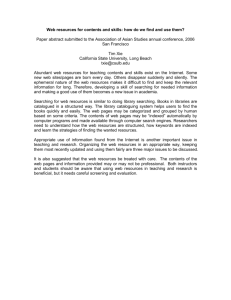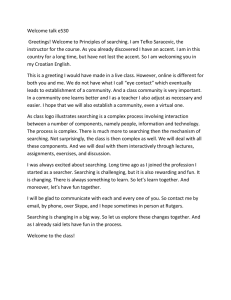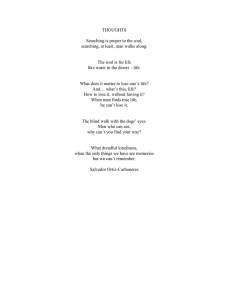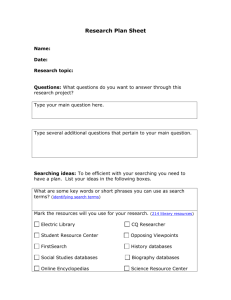Assignment01.doc
advertisement
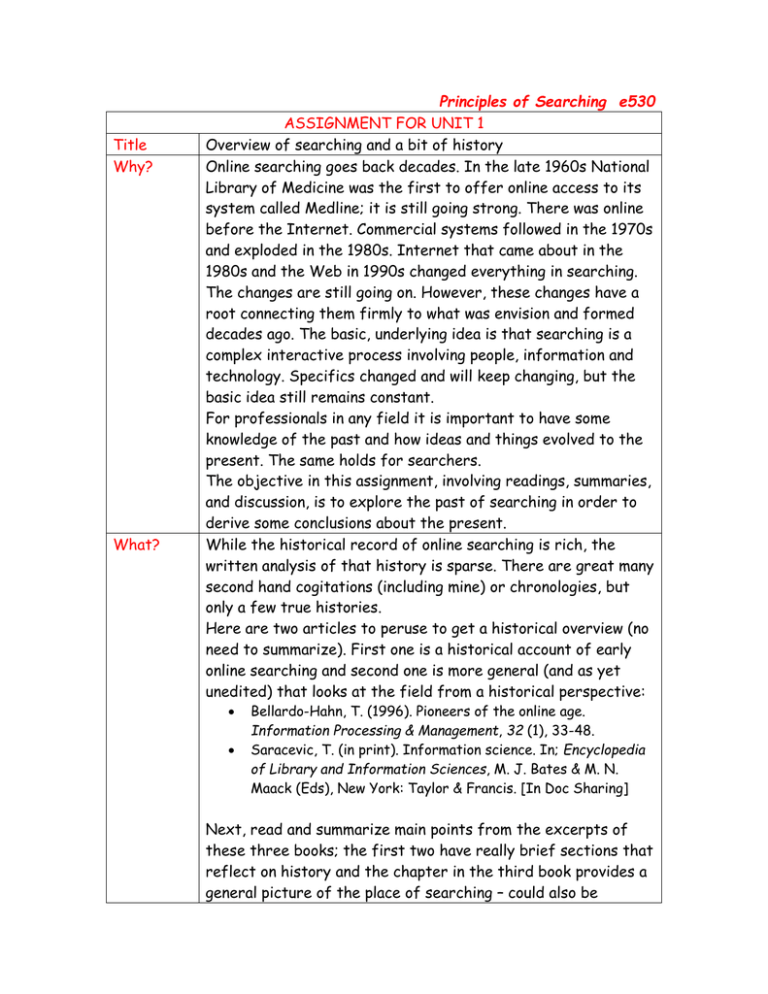
Title Why? What? Principles of Searching e530 ASSIGNMENT FOR UNIT 1 Overview of searching and a bit of history Online searching goes back decades. In the late 1960s National Library of Medicine was the first to offer online access to its system called Medline; it is still going strong. There was online before the Internet. Commercial systems followed in the 1970s and exploded in the 1980s. Internet that came about in the 1980s and the Web in 1990s changed everything in searching. The changes are still going on. However, these changes have a root connecting them firmly to what was envision and formed decades ago. The basic, underlying idea is that searching is a complex interactive process involving people, information and technology. Specifics changed and will keep changing, but the basic idea still remains constant. For professionals in any field it is important to have some knowledge of the past and how ideas and things evolved to the present. The same holds for searchers. The objective in this assignment, involving readings, summaries, and discussion, is to explore the past of searching in order to derive some conclusions about the present. While the historical record of online searching is rich, the written analysis of that history is sparse. There are great many second hand cogitations (including mine) or chronologies, but only a few true histories. Here are two articles to peruse to get a historical overview (no need to summarize). First one is a historical account of early online searching and second one is more general (and as yet unedited) that looks at the field from a historical perspective: Bellardo-Hahn, T. (1996). Pioneers of the online age. Information Processing & Management, 32 (1), 33-48. Saracevic, T. (in print). Information science. In; Encyclopedia of Library and Information Sciences, M. J. Bates & M. N. Maack (Eds), New York: Taylor & Francis. [In Doc Sharing] Next, read and summarize main points from the excerpts of these three books; the first two have really brief sections that reflect on history and the chapter in the third book provides a general picture of the place of searching – could also be considered historical: 1. Bell, S. S. (2009). Librarians guide to online searching. Westport, CN: Libraries Unlimited. Section: Historical background, (pp. 1-4). [Required book]. 2. Hock, R. (2007). The extreme Internet searcher’s handbook (2nd ed.). Medford, NJ: CyberAge Books. Section: A very brief history. (pp. 2-7). [Required book] 3. Walker, G., & Janes, J. (1999). Online retrieval: A dialogue of theory and practice. 2nd ed. Littleton, Colo.: Libraries Unlimited. Chapter 1: The search for information in the online age. (pp.1-19). [in Doc Sharing] [Note: Walker & Janes book is somewhat out of date, particularly when it comes to examples, but the general principles and issues described are still valid. It is a good example of how technologies and systems change relatively fast while the principles remain quite constant. So do not judge the book by its examples.] Note (just this time –but is valid for all submissions): Getting stuff: All cited items can be obtained through RUL or a URL as given; a few are in the course Doc Sharing. Exceptions are required books – you have them. Format: See syllabus for how to format assignments and exercises. E.g. Give full bibliographic information on anything read and cited. Style: style of summary is up to you, e.g. you may use bullets, you can write it as a critical essay, or choose whatever other style. File naming: When you submit your answers in the Dropbox you MUST follow the file naming format given in the syllabus. For instance, yourlastname_assignX.doc, where X stands for assignment number. More on the topic?: In bibliography. Or do a search Questions? After providing brief summaries, discuss and reflect on the following two questions: 1. After perusing and summarizing the readings what do you think: Do the authors have similar historical visions about historical forces and factors that affected online searching? Or, in what way do they differ? 2. What is your historical impression on this? What do you think were the most important factors and forces? You are free to disagree or take a different take. You can emphasize both questions equally, but you may also choose to go heavy on any one over the other.
